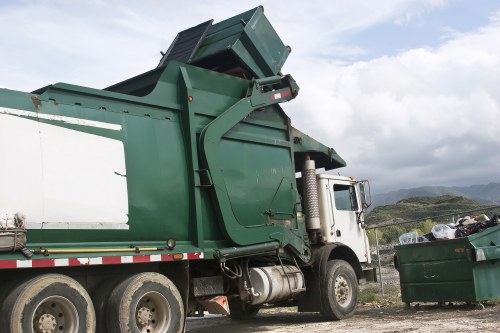Garbage Collection in Trash London: Ensuring a Cleaner, Greener City
Introduction to Garbage Collection in Trash London

Waste management is a critical aspect of urban living, and garbage collection in Trash London plays a pivotal role in maintaining the city's cleanliness and environmental health. With a population of over 9 million, London faces unique challenges in efficiently managing waste to ensure sustainability and public health.
In recent years, Trash London has implemented innovative strategies to enhance its garbage collection services. These initiatives not only aim to reduce the environmental footprint but also to engage residents in responsible waste disposal practices.
This article delves into the various facets of garbage collection in Trash London, exploring its history, current systems, recycling efforts, and future plans to create a more sustainable urban environment.
The Evolution of Garbage Collection in London

The history of garbage collection in London dates back to the 19th century, a time when the city grappled with severe sanitation issues. The infamous Great Stink of 1858 highlighted the dire need for an organized waste management system, leading to the establishment of the Metropolitan Board of Works.
Over the decades, London's approach to garbage collection has transformed significantly. From rudimentary open-air dumps to sophisticated, multi-stream recycling facilities, the city's waste management infrastructure has evolved to meet the growing demands of its population.
Today, Trash London employs advanced technologies and strategic planning to efficiently collect and process waste, reflecting the city's commitment to environmental stewardship.
Current Garbage Collection Systems in Trash London

Trash London operates a comprehensive garbage collection system designed to handle the diverse waste stream generated by its residents and businesses. The system encompasses several key components, each contributing to effective waste management.
- Residential Collection: Regular curbside pickups for household waste, recyclables, and organics.
- Commercial Services: Tailored waste management solutions for businesses, including bulk waste collection and specialized recycling programs.
- Public Recycling Centers: Accessible facilities where residents can drop off recyclable materials and large items.
- Smart Waste Solutions: Implementation of smart bins and sensor technologies to optimize collection routes and reduce operational costs.
Types of Waste Collected

Effective garbage collection in Trash London involves segregating waste into various categories to facilitate recycling and minimize landfill use. The primary types of waste collected include:
- General Waste: Non-recyclable and non-compostable materials destined for landfill disposal.
- Recyclables: Materials such as paper, plastic, glass, and metal that can be reprocessed into new products.
- Organic Waste: Biodegradable waste like food scraps and garden clippings, which are composted to produce fertilizer.
- Hazardous Waste: Dangerous materials, including chemicals and electronic waste, handled with special care to prevent environmental contamination.
Recycling Initiatives and Their Impact

Recycling initiatives are at the heart of garbage collection in Trash London, driving the city towards a circular economy. By encouraging the separation and recycling of waste, London reduces its reliance on natural resources and lowers greenhouse gas emissions.
Key recycling programs include:
- Single-Stream Recycling: Simplifies the recycling process by allowing all recyclables to be collected together, increasing participation rates.
- Community Recycling Drives: Engage neighborhoods in collecting and sorting recyclable materials, fostering a sense of community responsibility.
- Public Awareness Campaigns: Educate residents about the importance of recycling and how to properly sort waste, enhancing the effectiveness of collection efforts.
These initiatives not only contribute to environmental sustainability but also create economic opportunities through the recycling industry.
Challenges in Waste Management
Despite significant progress, garbage collection in Trash London faces several challenges that need to be addressed to ensure continued success:
- Population Growth: Increasing population density intensifies waste generation, necessitating scalable waste management solutions.
- Resource Allocation: Ensuring adequate funding and resources for waste management services can be challenging amidst competing urban priorities.
- Waste Sorting Compliance: Achieving high compliance rates in waste sorting requires ongoing education and enforcement efforts.
- Technological Integration: Incorporating advanced technologies into existing systems requires investment and infrastructure upgrades.
Future Plans for Sustainable Waste Management
Trash London is committed to advancing its waste management practices to meet future sustainability goals. Key plans include:
- Zero Waste Strategy: Aiming to eliminate all landfill waste by increasing recycling and composting rates.
- Advanced Recycling Technologies: Investing in state-of-the-art recycling facilities to improve efficiency and broaden the range of recyclable materials.
- Public-Private Partnerships: Collaborating with businesses and community organizations to enhance waste management services and innovation.
- Educational Programs: Expanding initiatives to educate residents about sustainable waste practices and the benefits of recycling.
How Residents Can Participate
Active participation from residents is crucial for the success of garbage collection in Trash London. Here are ways individuals can contribute:
- Proper Waste Segregation: Separating recyclables, organics, and general waste ensures efficient collection and processing.
- Reducing Waste: Minimizing single-use items and opting for reusable alternatives can significantly decrease waste generation.
- Composting: Composting organic waste at home reduces the burden on municipal waste services and enriches the soil.
- Participating in Recycling Programs: Engaging in local recycling initiatives and community drives supports the broader waste management system.
By adopting these practices, residents can help create a cleaner and more sustainable London.
Conclusion: The Path Forward
Garbage collection in Trash London is a dynamic and evolving system that plays a critical role in the city's sustainability efforts. Through continuous improvement, innovative technologies, and active community involvement, London is making strides towards effective waste management.
As the city continues to grow, addressing the challenges in waste management will require collaborative efforts from government, businesses, and residents alike. By embracing sustainable practices and supporting advanced waste collection systems, Trash London can achieve a cleaner, greener future for all its inhabitants.
Contact us today to learn more about how you can participate in making London a beacon of environmental responsibility.